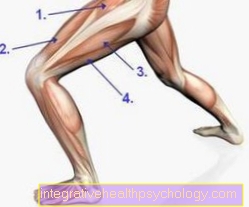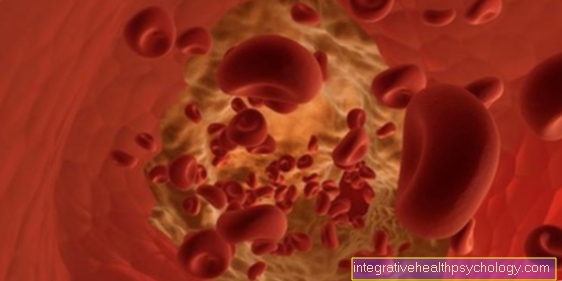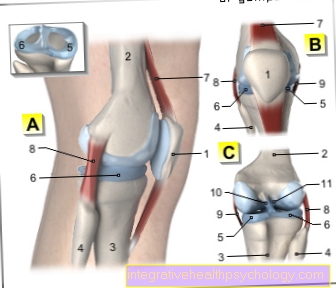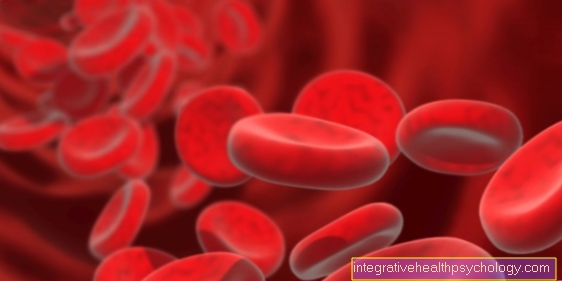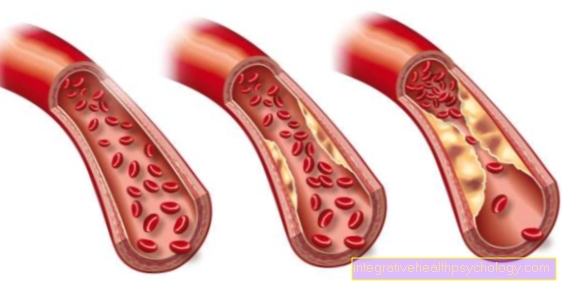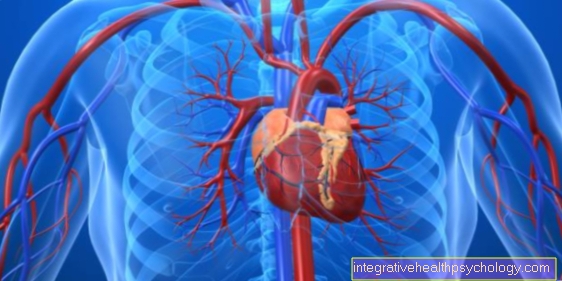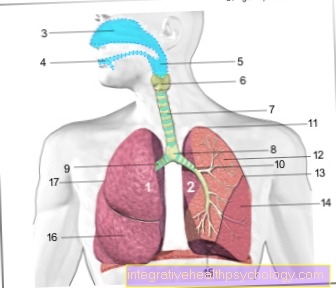Vigantoletten®
definition
Vigantoletten® is a vitamin preparation in tablet form that contains vitamin D3 (Synonym cholecalciferol) contains. It is used in the event of a deficiency or to prevent a deficiency in vitamin D3 and a consequent disruption in calcium metabolism.
application areas

In general, Vigantoletten® are used for all types of vitamin D3 deficiency, as long as no disturbance in the absorption of vitamin D3 or calcium in the Gastrointestinal tract consists.
In particular, the use of Vigantoletten® is recommended for patients with an already existing osteoporosis - a disease with decreasing Bone density, the so-called "Bone loss“- recommended as an additional measure. It also becomes the Rickets prevention - a calcification disorder in growing age - used.
Vigantoletten® are also used for calcification disorders of the bones in adulthood, the Osteomalacia, used.
Effect of vitamin D3
Vitamin D3 will absorbed in the intestine and about the Bloodstream distributed in the body. It serves the Regulation of calcium metabolism in the body, so that only if the vitamin D3 concentration is high enough can it be absorbed as required Calcium is possible in the intestine. The absorbed calcium is used by the body, among other things, for the Bone building used and ensures high stability of the Bone.
The active substance
The active substance Colecalciferol or Cholecalciferolcontained in Vigantoletten® is also called vitamin D. Vitamin D is a fat soluble Vitamin, is absorbed into the body in the small intestine. It is found naturally in foods such as fish and eggs, but the body can also produce it entirely itself. It is usually present in food as an inactive precursor and has to be activated first, because only the activated form is able to carry out the tasks that the vitamin has.
The production of the vitamin, which is also a hormone, in the body is extremely complex and involves several steps, some of which take place in the skin, liver and kidneys. As already mentioned, it plays a crucial role in the calcium and phosphate balance. So it promotes the absorption of these two elements into the body and ensures that they are released from the bones when the levels of calcium or phosphate in the blood drop. This means that the bones are, so to speak, the human stores of calcium and phosphate. Conversely, however, it also ensures that calcium in particular is built into the bones when they become too unstable. Vitamin D itself can be stored in fat cells and released when needed.
Difference to vigantol oil
Vigantol oil contains besides Vitamin D also Triglycerides, so Fatsthat are in liquid form. Since vitamin D is a fat-soluble vitamin, it can be absorbed by the body faster and more efficiently with oil. Thereby it seems stronger and is prescription only. Before taking it should be ensured that there are no allergies to ingredients and the Calcium levels in the blood must be checked carefully. If the concentration of calcium increases too much, it can Cardiac arrhythmias, Constipation, one Inflammation of the pancreas and neurological problems like fear and depressions come. Therefore, the dose prescribed by the doctor should never be exceeded and a doctor should be contacted should this ever occur.
Vitamin D3 production
The body is able to do this Produce vitamin D3 yourself. To do this, the preliminary stage of this Hormone, the so-called dehydrocholesterol, and can be converted to the ultimately effective vitamin D3 through various conversion processes. For this conversion is the UV-B proportion of sunlight mandatory. Without exposure to the sun, the body's own production of this vitamin is not possible and can Deficiency symptoms to lead.
The factors that prevent the body from producing sufficient vitamin D3 naturally include heavy cloud cover, smog and sunscreen. Sunscreen already prevents UV-B radiation on the skin almost completely from a sun protection factor of 8. The other way round is enough A quarter of an hour in the sun every day arms and face should not be covered by clothing to ensure adequate vitamin production. A longer stay in the sun does not lead to a significantly increased vitamin production, so it helps to prevent Skin cancer the use of sunscreens is recommended. A visit to a solarium does not increase the production of vitamin D3, as UV-A radiation is mainly used.
Contraindications
Vigantoletten® must not be taken if a increased levels of calcium in the blood or urine is present, as otherwise there is a risk of increased calcium storage due to the effects of the hormone. At a Disturbance of the parathyroid hormone balance for example if the Parathyroid glands Vigantoletten® must also not be taken, as the vitamin D requirement can fluctuate greatly in this disease and regular supplementation with Vigantoletten® can lead to an overdose. Patients leading to the formation of calcium-containing Kidney stones are not recommended in order not to provoke new kidney stones.
Side effects
Side effects usually occur when taking Vigantoletten® through a Overdose on. Overdosing can lead to a increased calcium content come in the blood. Increased calcium levels in the blood can Nausea, vomiting, impaired consciousness and irregular heartbeat cause.
A permanent increase in the calcium concentration ensures a calcification of the kidney, Kidney stone formation and calcification of other tissues such as the Vessels. In rare cases it can cause a allergic reaction come after taking Vigantoletten®.
Dosage and price (500, 1000, 2000 I.U.)
Vitamin D can be taken by children, adolescents and adults if there is a vitamin D deficiency and an associated illness. It is sold in various doses of 500, 1000 and 2000 I.U., i.e. international units. 500 I.U. correspond to an amount of 12.5 µg colecalciferol per tablet. Diseases that can be triggered by a vitamin D deficiency are for example osteoporosis and rickets, a disorder of calcification during the development of bones in childhood.
The exact dosage should be made by a doctor. Vigantoletten® do not require a prescription, but can only be bought in pharmacies. In general, side effects rarely occur, as vitamin D is a substance that can naturally also be produced by the body itself. Side effects include hypercalcemia and hypercalciuria, which are increased levels of calcium in the blood and urine. Therefore, the tablets should not be taken anyway if an increased concentration is known.
In addition, Vigantoletten® can affect the gastrointestinal tract, i.e. lead to abdominal pain or diarrhea. Since the skin is a place where vitamin D is made, itching or rashes can occur. It should also not be taken if there is a known allergy to cholecalciferol.
During pregnancy, medication should generally not be taken without consulting the attending physician, so in the case of such medication or during breastfeeding, you should first ask your own doctor. The duration of the intake and the exact dose should be discussed with the doctor in order to prevent possible complications.
The price for a pack depends on the number of tablets contained and the exact concentration of vitamin D. It can also vary considerably depending on the seller.
Vigantoletten® for babies
Vigantoletten® can also be given to babies. Here, too, it is important to discuss this with the pediatrician responsible beforehand. Vigantoletten® promote the development of bones in babies and small children by promoting mineralization, i.e. the incorporation of minerals such as calcium. Since vitamin D plays a crucial role in the calcium balance, taking it can positively promote the bones as well as the development of teeth. Especially in months with little sunlight, it can be useful to give babies and toddlers vitamin D, as sunlight is required for the production of the vitamin. Vigantoletten® with 500 I.U. or special preparations for children that also contain fluoride, which supports tooth development.
Vigantoletten® with fluorine
There are also preparations that also contain fluorine. Fluorine is a trace element in the human body, so it is only needed in small quantities. Still, it's important! It is especially essential for bones and teeth, but can also be found in tiny amounts in the blood. In the bone, it is used for stabilization by activating cells that build up bone substance. Vigantolettes®, which also contain fluorine, can therefore be taken well by older women after menopause, for example, to reduce the risk of osteoporosis.However, several drugs that affect bone metabolism should not be taken at the same time - in this case, it is best to consult a doctor. Fluorine is also often found in toothpaste and protects against tooth decay. Taking it in the form of tablets can also protect the teeth.
Ingestion
Before taking it, it should be absolutely ruled out that there is an allergy. The possible intake of Vigantoletten® should always be discussed in advance with a doctor, for example your family doctor. If you forget to take it once, it doesn't matter, but under no circumstances should you take a double dose when you next take it, as this could lead to side effects and an overdose. During pregnancy or while breastfeeding, Vigantoletten® should only be taken after consulting a doctor.
Ingestion as sticks
Vitamin D can also be taken in the form of a powder, packed in so-called “sticks”. A stick usually contains 1000 I.U .. The same information on dosage, ingestion and possible side effects must be observed as with the tablets.
Ingestion as drops
Vitamin D can also be given in the form of drops, which can be particularly helpful in the case of children as it makes it much easier to take. However, you should pay close attention to how much vitamin D there is in the drops. In the past 400 I.U. contained in the drops, now there are often almost twice as many. This can lead to overdose and side effects. Of course, you want to avoid this especially with small children. You should therefore find out exactly what the preparation you are giving your child and, after switching to another, read whether the concentration of vitamin D has changed. If necessary, a doctor should then be contacted again to adjust the daily dose.
Taking Vigantoletten® in children
The intake of Vigantoletten® is recommended for children in the first six months of life to prevent rickets. In particular with infants who are born in the dark season, there is a risk that they cannot produce enough vitamin D3 due to insufficient solar radiation and consequently have too little calcium available for bone growth.
For children born in summer, the intake of Vigantoletten® is very controversial, as the body can cover its own needs with sufficient sunlight. However, due to sun protection measures, there is always a calcium deficiency in children who have not taken a vitamin D preparation. Older children who are growing can also suffer from an undersupply, as there is an increased need for calcium during the growth phase.


